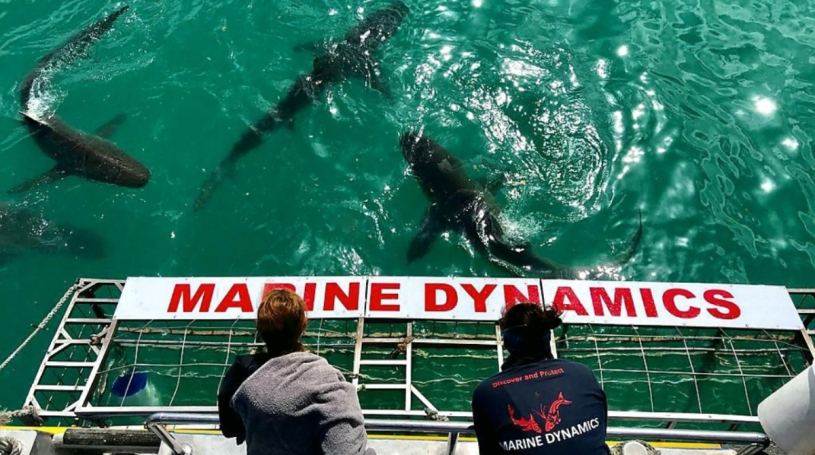Marine Dynamics: Sharks worth more alive, for a dive!
In South Africa’s waters, sharks are not just an attraction for thrill-seekers; they are at the heart of a critical conservation effort led by Marine Dynamics and the Dyer Island Conservation Trust. Despite the growing caution among tour operators against shark cage diving, Wilfred Chivell, CEO of Marine Dynamics and founder of the Dyer Island Conservation Trust, emphasizes that responsible shark diving offers a crucial lifeline for sharks while educating the public on their plight.
“We are facing a global crisis with sharks,” Chivell says. “Longline fishing practices are devastating shark populations at an alarming rate. Legal fishing permits issued by the DFFE allow longliners to operate along the coast from Gqeberha (Port Elizabeth) to Quinn Point, targeting sharks for their meat, fins, and other products. We must all take action to protect these remarkable creatures.”
A powerful tool in this conservation strategy is shark cage diving, but some tour operators advise against it, believing it constitutes harmful human interaction. This perception, Chivell argues, overlooks the rigorous guidelines South African operators follow to ensure safety for both sharks and people, while allowing sharks to remain wild. “In South Africa, sharks aren’t fed or handled in cage diving. They respond naturally to scent trails, much like they would in the wild, while divers are safely enclosed. There’s no harm or exploitation of the animals,” he adds.
One strong advocate for ethical shark conservation practices is Richard Peirce, a leading shark conservationist, broadcaster, and author. Peirce, who has spent over 30 years championing shark welfare, endorses cage diving as a conservation-positive practice that plays a vital role in raising awareness and understanding.
“Well-intentioned tour operators who ban human-wildlife interactions across the board risk harming certain ecotourism activities that benefit conservation,” says Peirce. “Shark diving, when done responsibly, does not involve feeding or handling wild animals; instead, it allows them to be seen in their natural state. Sharks become valuable alive, rather than dead.”
South Africa was the first country to legally protect the Great White Shark in 1991, setting a precedent for global shark conservation. Since then, responsible cage diving operators like Marine Dynamics have worked tirelessly to maintain these protections, and the effects have been profound. “In Gansbaai, we’ve secured a no-take fishing zone, providing sharks with a sanctuary,” Chivell explains. “This is an example of shark diving’s direct impact on conservation.”
Over the past 25 years, Marine Dynamics has hosted tens of thousands of divers, correcting misconceptions and encouraging many to become shark conservation advocates. Participants leave with a new understanding of sharks’ place in the ecosystem and the urgent need to protect them.
“Worldwide, sharks are being decimated,” Chivell stresses. “Longline fishing vessels with thousands of baited hooks are slaughtering these animals indiscriminately. Every dive we host gives sharks a voice, helping to build a global community that values their survival.”
In a time when sharks are disappearing at unprecedented rates, responsible shark diving presents a vital opportunity to connect people with these misunderstood animals and foster a commitment to their protection. For Marine Dynamics, it’s not just about tourism – it’s about ensuring a future for one of the ocean’s most important and endangered predators.
“By creating a sustainable value chain, we support the livelihoods of guides, crew, service providers, local restaurants, shops, and other tourism partners, and contribute significantly to the South African economy. Importantly, this is achieved in a non-consumptive way – without taking the life of a single shark. A living shark has immeasurable value, generating benefits that extend far beyond the ocean and positively impact countless people” says Chivell.
For more information on how you can support shark conservation efforts, please contact Marine Dynamics or visit the Dyer Island Conservation Trust website.
























